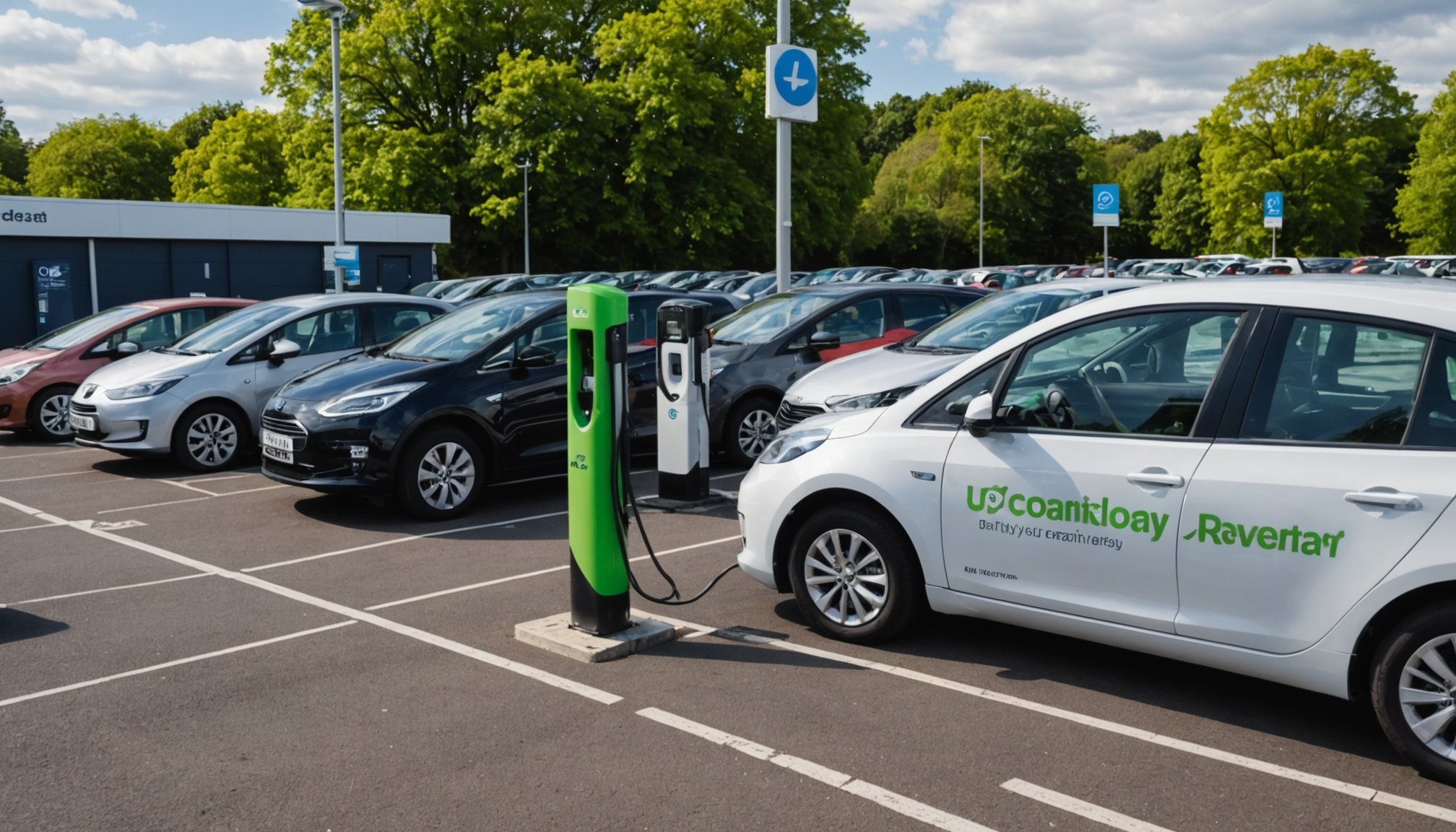Overview of the Electric Vehicle Landscape in the UK
The electric vehicles (EV) sector in the UK is experiencing a transformative shift as increasing numbers of consumers transition away from traditional petrol and diesel cars. The current state of EV adoption highlights a growing acceptance, fuelled by heightened environmental awareness and supportive government policies. Significantly, the UK car rental market is gradually embracing this change, influenced both by demand and regulatory encouragement.
Government incentives remain pivotal in driving this adoption. Programs offering grants and subsidies for EV purchases have made electric vehicles more accessible. Additionally, infrastructure investments, particularly in enhancing charging networks, have alleviated concerns about range anxiety—one of the main hurdles for EV usage.
Have you seen this : Proven strategies for uk fashion labels to reduce returns and enhance customer happiness
Furthermore, EV adoption trends suggest a promising trajectory. Analysts forecast a substantial rise in EV demand within the car rental sector. This is primarily due to the combination of consumer preference for sustainable travel options and the necessity for rental companies to align with environmental policies. As the UK’s roadmap targets a zero-emission future, rental companies are exploring EV fleets as practical solutions to meet regulatory standards while also appealing to eco-conscious renters.
In essence, the UK is poised for accelerated EV growth, significantly impacting not just personal transportation but also commercial sectors such as car rentals.
Successful Case Studies of UK Car Rental Companies
Exploring successful strategies within UK rental companies sheds light on innovative approaches in the industry. Let’s delve into the pivotal elements that have marked success.
Company A: Pioneering EV Integration
Company A has excelled by integrating electric vehicles (EVs) into their fleet. A significant strategy was rapidly expanding their EV inventory, setting a benchmark for the industry. Through proactive customer engagement and modified marketing strategies, they managed to make EVs appealing to a broader market segment. Their campaigns emphasised the environmental benefits and cost-efficiency of EV usage, resonating well with eco-conscious customers.
Operational shifts were necessary to accommodate EVs, such as establishing specialised teams for EV maintenance. This adjustment ensured minimal downtime and high customer satisfaction. The investment in charging infrastructure was yet another pivotal move, demonstrating foresight and commitment to customer convenience.
Company B: Sustainability and Innovation
Focusing on green initiatives, Company B distinguished itself through creative partnerships with EV manufacturers, leading to a mutually beneficial exchange of technology and resources. These collaborations have not only enhanced their product offerings but have also had a profound impact on customer satisfaction and acquisition. Their innovative approach to sustainability includes offering incentives for long-term rentals of EVs, aligning with an increasing consumer preference for environmentally friendly travel options.
Through these comprehensive strategies, these UK rental companies not only redefine success but set a new standard in competitive innovation.
Technological Innovations in Electric Vehicles
The rapid growth in EV technology has revolutionised the automotive industry, with significant advancements in battery technology enhancing vehicle range and efficiency. Modern electric vehicles boast superior battery capacities, leading to extended travel ranges on a single charge. This progress addresses one of the primary concerns of potential EV owners: range anxiety.
Expanding the charging infrastructure is equally crucial. Enhanced networks enable convenient charging solutions, reducing downtime and increasing the viability of electric vehicles for long trips. As more charging stations become available, anxiety related to battery limitations diminishes, allowing smoother transitions to clean energy vehicles.
Meanwhile, telematics plays an integral role in optimising fleet management and bolstering sustainability efforts. By monitoring vehicle performance, telematics systems provide real-time data that improves route efficiency, lowers operational costs, and decreases carbon footprints. Companies managing large fleets can leverage telematics to track vehicle health and usage patterns, ensuring routine maintenance and increasing lifespan.
The synergy between these technological advancements not only propels electric vehicles forward but also fosters a sustainable future. As the landscape of EV technology continues to evolve, stakeholders are encouraged to support infrastructure development and explore telematics solutions for enhanced eco-friendly transportation options.
Sustainability Considerations for Car Rental Companies
Car rental companies are steadily embracing sustainability to meet customer demand and reduce their carbon footprint. A notable way to achieve this is by incorporating electric vehicles (EVs) into their fleets. Electric vehicles play a significant role in reducing emissions, contributing to a cleaner environment and aligning with eco-friendly practices.
Adopting electric vehicles not only aids in carbon footprint reduction but also caters to the rising demand for green alternatives. Customers increasingly prefer car rentals from companies that promote sustainability, providing a unique opportunity for these businesses. By showcasing their commitment to the environment, car rental companies gain a competitive edge in the market.
In addition, these companies can implement various strategies to minimize overall carbon footprints. This includes optimizing route planning to enhance fuel efficiency and offering incentives for longer rentals to reduce the frequency of transportation. Furthermore, partnerships with local renewable energy providers for EV charging infrastructure can bolster eco-friendly practices.
Marketing sustainability as a competitive advantage is crucial. By highlighting the environmental impact of their initiatives, companies not only appeal to environmentally conscious customers but also establish themselves as industry leaders. Through sustainability, they have the chance to redefine their brand and reputation, offering both long-term cost savings and environmental benefits.
Challenges Facing Car Rental Firms Transitioning to EVs
Transitioning to electric vehicles (EVs) presents several EV challenges for car rental firms. A primary hurdle is the initial investment costs associated with purchasing EVs and setting up the necessary infrastructure. This often involves a hefty financial outlay which impacts the potential return on investment (ROI).
Financially, firms face market barriers as they adapt to a new, evolving landscape. These barriers include high upfront costs and limited financial incentives in some regions. Firms must weigh the long-term savings in fuel and maintenance against these initial expenditures to make informed decisions.
Misconceptions surrounding electric vehicles add another layer of complexity. Many consumers still harbour doubts about EVs’ range and effectiveness, often questioning their practicality. Rental firms must work to educate their customers, dispelling myths and promoting the ecological and economic benefits of using EVs.
Moreover, addressing the maintenance and service infrastructure for EVs remains a significant concern. Unlike traditional vehicles, EVs require specialized charging stations and maintenance services. In areas with less developed infrastructure, this can become a formidable barrier. Investment in training staff and establishing reliable servicing networks is crucial to alleviate such concerns and streamline the transition to EVs across rental operations.
Actionable Recommendations for Adapting to the EV Market
Transitioning to electric vehicles (EVs) requires strategic planning and adopting best practices tailored to the car rental sector. Developing a thoughtful, phased approach to fleet transition is crucial for ensuring business continuity and customer satisfaction. Companies should start by selecting high-demand routes for their initial EV deployment. Gradually expanding the electric fleet allows for managing costs effectively while gathering valuable consumer insights.
An essential component of this strategy is consumer education about the advantages of EVs. Promoting awareness of the environmental benefits, cost savings, and innovative technology of EVs can enhance customer acceptance. Consider workshops, informative brochures, or digital campaigns as practical solutions. Providing platforms for potential renters to experience EVs without pressure can also bolster confidence and curiosity.
To bolster success in a shifting market, establishing partnerships with industry stakeholders is beneficial. Collaborating with EV manufacturers, charging infrastructure providers, and regulatory bodies ensures resources and insight for a smooth transition. These partnerships can secure financial incentives, technical support, and shared marketing efforts, ultimately driving the adaptation process forward efficiently.
With these recommendations, car rental companies can navigate the EV market confidently, balancing innovation with operational stability.











